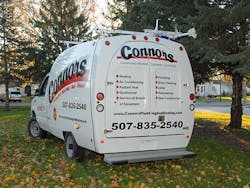CHICAGO — The talent shortage has been looming over the world of contractors for years, but has anyone felt the squeeze quite yet? If you bring your attention out east to a small town called Jackman, Maine, the answer would surely be “Yes.”
The town, which features a slight population of approximately 800 people, is quite isolated. Jackman’s lone plumber recently retired, leaving jobs he used to do to far-away plumbers and local do-it-yourselfers. For that reason, Larry and Sheryl Harth decided to dedicate the 2015 Inza and Harry Hughey Memorial Scholarship to award $2,000 to anyone who wanted to become Jackman’s plumber.
Denise Plante, principal of Jackman’s Forest Hills Consolidated School District, which has been helping with the search for a scholarship recipient, said there has been a decent amount of interest since the scholarship became known to the public in August 2014, but no action or decision on the recipient thus far.
“We need a plumber and want someone to become our plumber,” Plante said of why the Harths started this scholarship. “It went viral, kind of. We got press on NPR. A lot of inquiries have been made, but we don’t have a plumber that has moved here as a result yet.”
Unlike other towns, which may have metropolitan areas nearby, Plante said Jackman has a limited pool of plumbers from which to choose, thereby forcing homeowners to learn some simple plumbing tips and fix what they can. Even so, “There are still a lot of us who don’t how to do these things,” she said with a slight laugh.
Uncertain future in small, rural areas
Jackman isn’t alone. There are communities across the country that are wondering “What’s next?” when it comes to plumbers. In 2012, 53 percent of skilled trade workers in the U.S. were 45 and older and 18.6 percent were between the ages of 55 and 64, according to Economic Modeling Specialists International. More than 50 percent of the existing workforce is set to retire in the next decade. As the Baby Boomer generation starts to fade out, who will oversee the drains, pipe and plumbing of America’s heartland?
Peggy Hildebrandt, owner of Connors Plumbing & Heating Inc. in Waseca, Minnesota, said it has been “terrible” trying to find new talent for her small town plumbing and heating company. The area Connors serves is under 10,000 in population and the company has six techs in the field, two of whom have been with the company for more than three decades. However, they’re down one employee after one retired in November 2014.
In trying to bring new blood into the business, Hildebrandt said she’s worked with local schools to take kids on tours to show them that there is something other than white collar jobs in the working world.
“We’re just trying to think of ideas and ways to encourage more participation in the trades,” she said. “I think it’s a huge missed opportunity right now. Over the last 25 years, we’ve encouraged kids to go to college, but we’ve really neglected the quality trade positions. Those are good, respectable jobs as well.”
Rob Buckley, a business coach with Nexstar Network, a business networking organization that helps coach contractors, said he grew up in a small town and was taught about trades all throughout his school days. However, much that has been stripped from public schools over the past two decades. Now, Buckley said he isn’t sure kids really know how well contractors can monetarily do and said many aren’t sure if it would be a line work they could be proud of.
“College counselors and school officials need to let people know this is an honorable profession,” Buckley said. “It’s not just the money, but it’s a sense of self-worth. ‘I built something with my hands and brought safety and comfort to a family.’ That’s something not a lot of people can say that they do. If you’re interested in a career that pays very well, you like to have interactions with people and love just having a sense of a job well done, this is a great trade.”
Dirty work?
Eric Aune, CONTRACTOR columnist, owner of Aune Plumbing LLC, located in Zimmerman, Minnesota, and founding partner and vice president of mechanical-hub.com, doesn’t see younger college-aged people considering the trades as a first, second or even third choice.
“They’ve been led to believe that it’s dirty, hard work by parents or people around them that,” Aune said. “That’s unfortunate. Being a business owner myself and working in the trades my entire life, I know what journeymen plumbers in Minnesota stand to make. It’s a lot more than his neighbors who are teaching high school level classes.
“There’s a place for everything,” he said. “College has its place, too. But the biggest problem we have is that we’re telling these kids that they have to go, and college isn’t for everybody.”
Graduating from college in modern times certainly doesn’t guarantee you a job, Aune noted. Numbers from The Economy Policy Institute back this up, as a report from last year, titled “The Class of 2014: The Weak Economy Is Idling too Many Young Graduates,” said that the unemployment rate of those under 25 years of age was 14.5 percent. If you factored in the 1 million “missing” young workers, those who are not employed or actively seeking due to scarce job opportunities, the rate would be more than 18 percent.
This is a huge advantage the trades present, Aune said.
“If you enter a plumbing apprenticeship program or electrician program or want be trained in HVAC, all of the time you spend on your training is realized with a job in the industry that you’re training for,” he said. “There’s no mystery there. That’s something that doesn’t get talked about at all. You can get a degree in business management and end up working in a car dealership, as an example. In the trades, you’re going to train for the certification or license that you end up working in. You’re wasting no time from the very beginning.”
In addition, a look at the numbers considering plumbers, pipefitters and steamfitters from the U.S. Bureau of Labor Statistics shows a 21 percent estimated increase in jobs from 2012 to 2022, faster than the average for all other occupations.
Even with the great outlook, interest in the trades is very low. A survey from RIDGID found that a mere 6 percent of high school students hope to have a future in any of the trades, be it plumbing, HVAC or work as an electrician. With the BLS estimating that about 167,000 of the current 500,000 U.S. plumbers will soon retire, this amount of interest among younger people will simply need to become stronger.
Aune said students are conditioned to feel as though they need a four-year degree to survive in life, but he said this simply is not true.
“In our little towns here, I’m a small business owner and I go to our local district on career day,” Aune said. “I’ve set up a booth in the past and given talks in front to entire student bodies. I say, ‘Listen, this is an option.’ I show them that from the get go, you can be making $40,000 at the age of 18, possibly $70,000 to 80,000 per year four years later after apprenticeship. You work local, live in towns you grew up in and can have a house in the neighborhood you grew up in. It’s an attainable goal.”
In reality, Aune added that it is far more than just the dirty work many picture when they think of plumbing. Using his own experience, Aune said he’s been a plumber for 20 years and the only toilet he’s ever fixed is his own, focusing on his skillset as a hydronic radiant heating system specialist. He also uses a bevy of high-tech gadgets on a day-to-day basis, something he believes should appeal to kids of all ages.
What does the future hold?
The lack of interest in trades as a serious career leaves many wondering what will happen when the Baby Boomers retire and no one replaces them. In Aune’s opinion, it will have an impact in all areas, but will be especially harmful for the economy of smaller towns.
“Losing a business like my own or so many of my competitors in the area, we are employing local people whether they’re grown adults or we’re starting them out. That would affect our local economy,” he said. “People are much happier when they work close to home. When you employ people close to home they tend to have a lot more pride in the job they do. There’s less stress.”
Buckley believes that when the Baby Boomer generation starts retiring, there could be a problem, asking “who are we back filling these jobs with?” Nexstar, his company, has programs such as The Legacy Foundation, which provides training for HVAC, electrical and plumbing industries, and Troops to Trades, which helps military veterans find jobs in the trades upon their return home.
Even so, Buckley believes there still needs to be far more work done to build interest among the youth. In his mind, the worst case scenario falls to the hands of the customer. Repairs and replacement costs will rise as there are fewer plumbers. Hires for jobs may have to come from far out of town.
“That’s going to be built into the costs,” Buckley said. “The costs of home ownership will actually increase. That’s from a society standpoint. That’s the thing that will be felt first. The other challenging piece out there is finding the talent to do the job correctly. The difference in true craftsmen in the trade versus just a tradesman can’t be understated. A craftsman has skills and knowledge. When we’re dealing with power, water or air, you want someone in your home who knows what they’re doing.”
Geographically, Hildebrandt said her company is uniquely positioned in a rural area that is just more than an hour away from the Twin Cities. The local population will never truly be out of the loop, as far as the ability to hire great plumbers in the area, but she believes the industry needs to “beat the drum” to get the word out there about just how great a career in plumbing can be.
Especially in small towns, the allure of being a great plumber could be a big attraction, Hildebrandt said, as she recently asked fellow contractors what makes them like the business so much.
“I think one of the advantages we have in a rural area is that we’re small. It’s a lot more personal,” she said. “Without exception, everyone noted their coworkers and quality of people they work with. When we hire, we try to hire for the long term. In a larger city, there are more opportunities to switch careers. In a rural setting, the odds are fewer that you’ll have to change jobs.”
As for what may draw the next generation of contractors to plumbing, Aune believes a renewed focus in the schools is necessary. Younger generations need to be shown that this is a good option, in many cases a better option than going to Liberal Arts College.
“Some of the smartest people I have the privilege to work alongside of are these HVAC technicians,” Aune said. “They’re just short of holding the piece of paper that says they’re electric engineers and they’re compensated well for it. I know guys that make $100,000-plus per year.
“There are things that can attract high school and college-aged kids to enter the trades, but the biggest hurdle is they don’t know about it and being told it’s just a fall back, something people that just couldn’t cut it in college,” Aune said. “But like I said, some of the smartest people I know didn’t go to college.”




